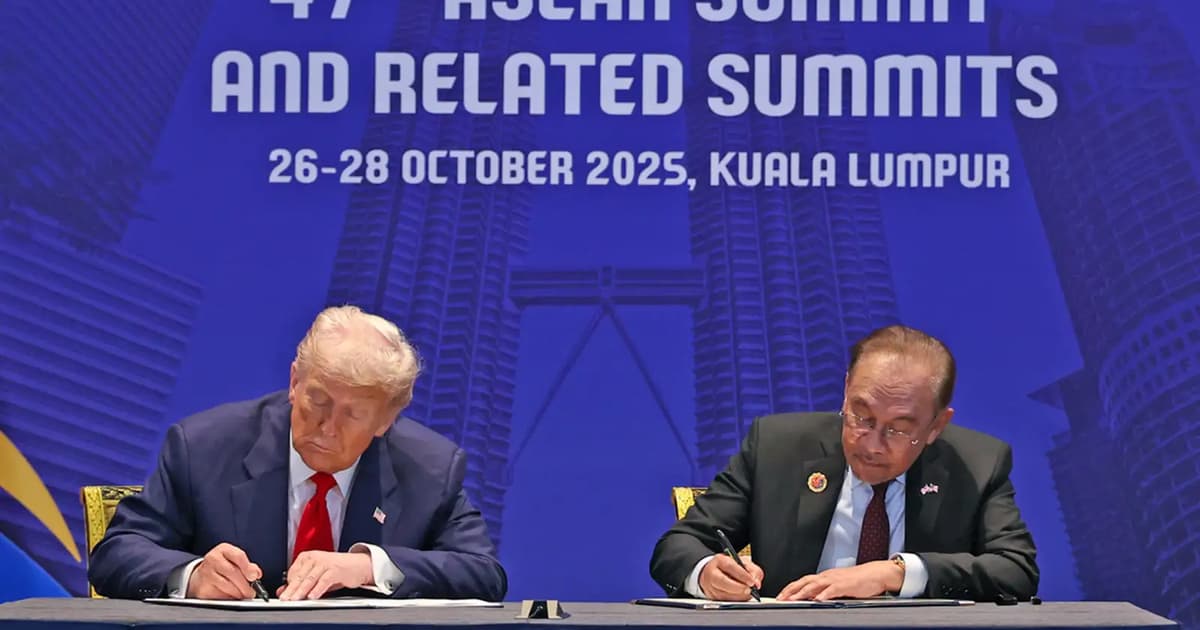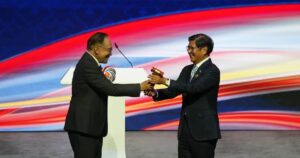
From Samirul Ariff Othman
In periods of geopolitical contestation, a nation depends on its publicly funded think tanks to speak with clarity and conviction.
Their task is simple: to analyse, to inform, and to safeguard the national interest.
Yet at the very moment the rakyat are debating the recent US–Malaysia trade agreements signed during US president Donald Trump‘s visit, our premier institutions are nowhere to be found.
While Asean is struggling to navigate an increasingly polarised region, Malaysia faces immediate questions about tariffs, market access, China relations, sanctions exposure, and the long-term shape of our export economy.
These issues demand rigorous, non-partisan examination — particularly from bodies financed by Malaysian taxpayers.
Instead, one of Malaysia’s leading think tanks chose to hold a conference on taxation.
The optics are not merely unfortunate; they are bewildering. This is the same institute whose previous taxation event was widely perceived as leaning towards the harmonised sales and services tax (SST) proposal — a perception that the media amplified.
Today, with the public demanding answers on the most consequential trade deal in years, the same think tank again retreats into the safety of an unrelated topic.
This is not the behaviour of an institution confident in its mandate. It is also not an aberration.
In recent years, the think tank has ventured into national youth debates, commented on the “third national car”, and repeatedly engaged in activities far outside its macroeconomic competence.
A public-funded think tank should not behave like a roving events organiser.
It must ask itself: Has it forgotten its core purpose?
Silence is not prudence, it’s negligence
Across Asean, serious policy institutes understand that sovereignty requires vigilance. They issue statements when foreign pressure mounts. They brief ministers when agreements carry risks. They guide public understanding when confusion threatens to harden into mistrust.
Malaysia deserves no less.
Yet our premier think tanks remain silent on basic questions:
- Did Malaysia concede too much for tariff relief?
- Does the agreement tilt our economy towards Washington?
- Will China retaliate — and how?
- What is our exposure to secondary sanctions?
- What happens when the US links future trade privileges to political alignment?
These are not academic curiosities. These are national interests.
And silence, in such moments, is not neutral. It is dereliction.
Speak for the public
This debate is about more than a single agreement. It is about the responsibilities of a publicly funded institution.
When think tanks refuse to address difficult issues, the vacuum will not stay empty. It will be filled by speculation, misinformation, partisan spin and social-media theatrics. In such moments, a credible think tank should anchor the national discourse, not abandon it.
If the conversation is turbulent, the duty to engage becomes stronger, not weaker.
Transparency, independence, and strategic clarity
Malaysia welcomes investment and trade from all partners — including the United States. But engagement must be governed by clear criteria: sovereignty, transparency and national interest.
Prime Minister Anwar Ibrahim has repeatedly emphasised that Malaysia must chart an independent course, without being captured by any foreign power. This principle collapses the moment our domestic institutions begin to self-censor out of fear, convenience, or comfort.
The Malaysian public deserves reassurance that someone is examining the strategic implications carefully, and communicating them honestly.
Public-funded think tanks must demonstrate that they are independent in thought, courageous in analysis, and transparent in their purpose.
As public anxiety grows, any refusal to address the US deal only widens the trust deficit between Malaysians and the very institutions meant to protect their long-term economic interests.
If analysis exists behind closed doors, it has limited value.
If memos circulate quietly, they do not inform the rakyat.
If experts have opinions, they should be offered openly.
In moments of strategic uncertainty, silence resembles complicity.
Malaysia cannot afford to stumble blindly into a new era of great-power rivalry. The public deserves facts, not evasions. It deserves principled guidance, not hesitation. And it deserves think tanks that are intellectually honest, not politically timid.
If Malaysia is to navigate the US-Malaysia deal — and the larger geopolitical tides surrounding it — we need institutions that think clearly, speak plainly and act courageously.
For the sake of national integrity, our eyes must remain open, not covered with wool by those entrusted to inform us.
Samirul Ariff Othman is an economist, international relations analyst, adjunct lecturer at Universiti Teknologi Petronas, and a senior consultant with Global Asia Consulting. He is also an FMT reader.
The views expressed are those of the writer and do not necessarily reflect those of FMT.






